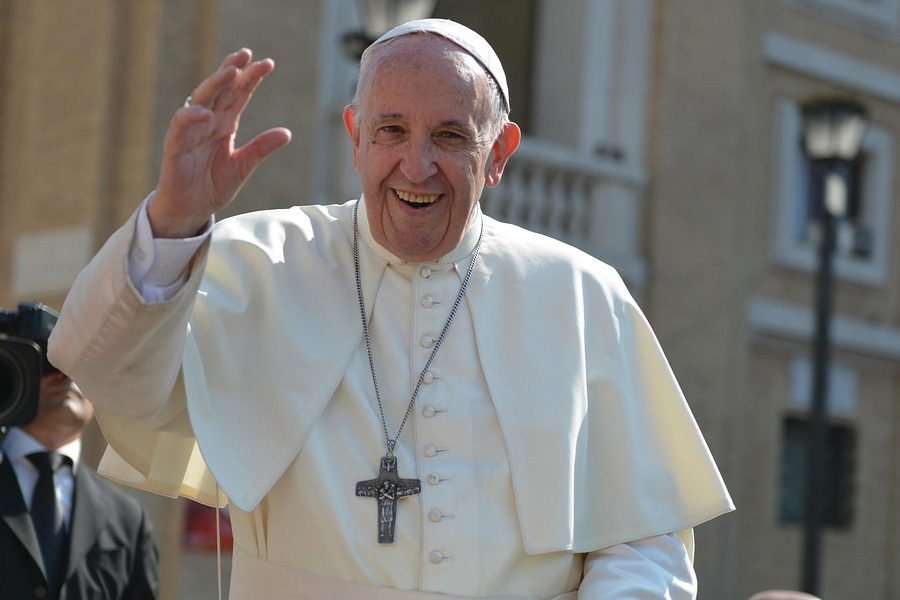Our first reading today is about our search for Wisdom, or, perhaps, about Wisdom’s search for us. On the one hand, Wisdom is readily found by those who seek her. On the other, she hastens to make herself known in anticipation of our desire. She makes her own rounds, seeking us out. So, in a way, Wisdom must be sought. But in another way, she can only be welcomed, as she graciously appears in our path, and meets us in our every thought.
What is Wisdom? Apparently far more than the mere accumulation of facts. For the ancient Hebrews, Wisdom was identified with the spirit of the Lord, which has filled the earth, and which holds all things together. Wisdom becomes an immanent universal principle — the internal principle of physical and moral life. To fix our thought on her is perfect understanding.
The juxtaposition, in our readings, of this passage from the Book of Wisdom with the parable of the wise and foolish virgins, brings home to us the Christian tradition, which equates Wisdom with the Kingdom of God, and with Christ.
The story is told of a young parish priest, who on the first anniversary of his ordination, was given a huge leather-bound volume by the parishioners. He said, “Thank you very much, but tell me, what book is this.” They responded, “It’s the story of your life, Father, based on your first year’s sermons.” Despite this cautionary tale, I’m going to impose a bit of autobiography on you.
When I graduated from Notre Dame, I was hired as a salesman by a trucking company. At the time this was regarded as a pretty good job…for a fellow with a History degree. In retrospect, I’m surprised they hired me. The personnel department must have found me a bit odd. I suspect I was the only applicant who, under hobbies, listed German idealist philosophy.
For a while things went pretty well. I lived in three cities in three years. I had an apartment, a company car and an expense account. I even succeeded in putting together my version of the perfect stereo system. Nevertheless, I found myself plagued by a vague sense of dissatisfaction.
Years ago, when I was teaching theology in a seminary in Nairobi, Kenya, I told this story to a classroom full of African seminarians. They found it easy to diagnose the cause of my sense of unease. “It’s obvious”, they said, “you needed a wife.”
But that solution to my problem didn’t occur to me at the time. Instead, I concluded that I was suffering from an inadequate world-view. I had kept up my reading of philosophy. Most nights, after work, I went to a local library and read Sartre and Nietzsche until 10 p.m. when the place closed. I imagined myself to be some kind of existentialist hero. I had to build my own world from scratch, find my own meaning, and love fate.
Alas, I wasn’t up to it. I wasn’t a hero after all. I was simply unable to make sense of a world without God. So, I made an intellectual decision to believe in God. I thought if I could just plug God into my world-view, my problems would be solved. I began to take my Catholicism seriously.
Within a year, that decision landed me in the seminary. Now everything fell into place. The world made sense. I had an opinion about everything, and couldn’t wait to tell people about it. I must have been a very trying dinner companion.
Because I had joined a religious order, my second year of formation was to be a novitiate year — a year of spiritual training in the foothills of Pikes Peak in Colorado. From what I had heard about this novitiate year, I didn’t think I’d like it. It sounded like the spiritual equivalent of the Marines Corps. The Marines, of course, are famous for taking a recruit completely apart, and reassembling him or her along completely different lines. I didn’t want to be taken apart. I was 25 years old, and had worked hard to become the person I was. The world finally made sense to me, and the last thing I wanted was to start again from the beginning.
Nevertheless, I showed up at the novitiate. I was a couple of weeks late, and very suspicious of what might happen, but I showed up. Most of my classmates seemed to be having a wonderful year. I, on the other hand, was always on the verge of being thrown out. I know now that the novitiate staff had marked me down as virtually conversion-proof.
Fortunately, a wise priest back at the seminary, wrote to my novice director and recommended that I be assigned, one day a week, to Mary Lynn Sheetz, who with her husband, ran a soup kitchen and shelter for the homeless a few miles away in Colorado Springs.
Mary Lynn was just as opinionated as I was, and every bit as eager to argue her case. However, it happened that she was much better at it than I was, and before very long, in the course of peeling potatoes and chopping carrots, she had convinced me that everything I knew, was wrong .
Though it didn’t feel like it at the time, this was the best thing that could have happened to me. I was so confused, that for the first time, real conversion became a possibility. I had come to the novitiate believing that Christ was one more factor to be worked into my view of the world. Christ perfected a system that was already pretty darn good.
Now I realized that Christ can’t be bolted onto any pre-existing system. He has to be embraced at the core of who we are. Only then can we work toward an understanding of anything else. And when I finally recognized my need, Christ graciously appeared in my path, and met me in every thought. I had my first brush with Wisdom.
And I was given a fresh perspective on our responsorial psalm: “O God, you are my God whom I seek; for you my flesh pines and my soul thirsts, like the earth, parched, lifeless and without water… Thus I will bless you while I live; lifting up my hands, I will call upon your name. As with the riches of a banquet shall my soul be satisfied, and with exultant lips my mouth shall praise you.”
Rev. Charles B. Gordon, C.S.C., is co-director of the Garaventa Center for Catholic Intellectual Life and American Culture at the University of Portland. He writes and records a regular blog called “Fractio Verbi.”





